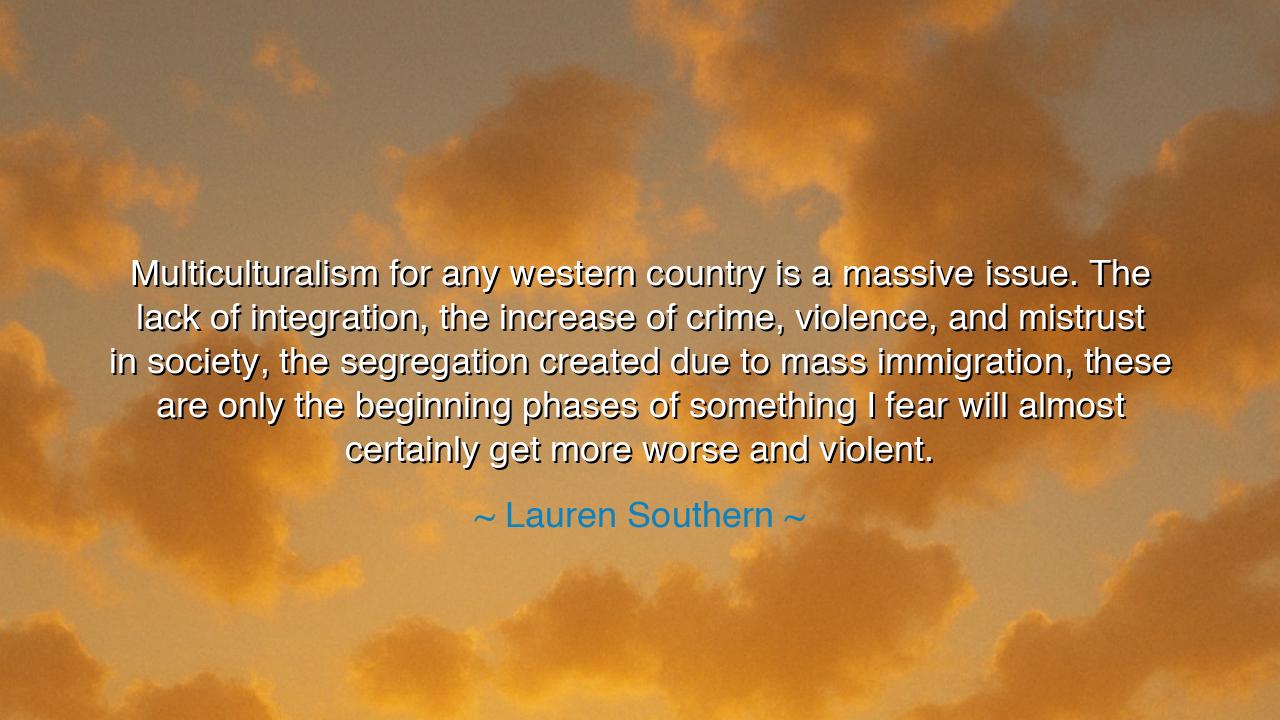
Multiculturalism for any western country is a massive issue. The
Multiculturalism for any western country is a massive issue. The lack of integration, the increase of crime, violence, and mistrust in society, the segregation created due to mass immigration, these are only the beginning phases of something I fear will almost certainly get more worse and violent.






"Multiculturalism for any western country is a massive issue. The lack of integration, the increase of crime, violence, and mistrust in society, the segregation created due to mass immigration, these are only the beginning phases of something I fear will almost certainly get worse and more violent." These words by Lauren Southern delve into the challenges that come with multiculturalism in modern Western societies, touching on the growing tensions and divisions that have surfaced in the face of mass immigration and the lack of integration. Southern's warning speaks to the difficult balance between cultural diversity and social cohesion, an issue that many nations must reckon with as the world becomes more interconnected. The question, then, is not whether multiculturalism can exist in these societies, but how it can be navigated in a way that prevents the erosion of unity and peace.
In the ancient world, multiculturalism was not a foreign concept. The Roman Empire, at its height, was a mosaic of cultures, languages, and religions. The Romans, though initially wary of their conquered peoples, eventually integrated a multitude of cultures into their empire, allowing them to maintain their own customs while adhering to Roman law. Yet, this integration was not always smooth, and tensions between the Romans and their subject peoples were frequent. While the empire offered its citizens citizenship and a degree of political unity, the social divisions remained, and the empire's diverse peoples often struggled to find common ground. The collapse of Rome itself can be partially attributed to these fractures, as the once unified Roman identity became fractured by a lack of cohesion among the very peoples it sought to unite.
Lauren Southern’s quote strikes at the heart of this very issue: the potential for fragmentation in a society when diverse groups fail to integrate fully. Western nations, like Rome, face the difficult task of maintaining a shared identity amidst growing diversity. The lack of integration that Southern refers to is not simply about the absence of economic opportunities or political rights, but about the social fabric of a nation—the way different groups coexist, communicate, and build a shared understanding of what it means to be part of that society. When that unity breaks down, when communities live in segregation, or when violence and mistrust rise, the nation faces a crisis of cohesion that can undermine its stability.
A historical parallel can be found in the civil rights movement in the United States. The African American community, long segregated and discriminated against, fought for inclusion and equality within a society that claimed to stand for freedom and justice. The battle was not just for civil rights but for a shared vision of American identity, one that could encompass the diversity of experiences and backgrounds. This struggle revealed the deep social divides within the nation and the challenge of integrating disparate communities into one cohesive society. While progress has been made, the legacy of segregation and the lingering tensions between different racial and cultural groups remain a reminder of the challenges multiculturalism poses in any society.
Southern's fears about violence and mistrust are not just theoretical. The world has witnessed the destructive power of cultural divisions in the form of ethnic violence, whether in Yugoslavia during the 1990s or in the Rwandan genocide in 1994. Both instances were the tragic result of historical tensions between ethnic groups that had been exacerbated by years of segregation, discrimination, and political manipulation. These violent eruptions were not caused by the existence of different cultures but by the failure to create spaces of understanding, respect, and mutual cooperation among them. It is a chilling reminder that multiculturalism—if not carefully managed—can lead to division and conflict, as groups begin to see each other as threats rather than partners in the shared human experience.
However, while Southern’s warning is rooted in a real fear of division, it is important to recognize that multiculturalism does not inherently lead to violence or mistrust. The problem arises when societies fail to integrate their diverse peoples into the economic, political, and social fabric of the nation. Integration requires more than just granting citizenship or rights; it demands the creation of spaces where people of different backgrounds can learn from each other, work together, and build a shared sense of purpose and identity. It requires empathy, understanding, and a commitment to tolerance that transcends cultural and religious differences.
The lesson of Southern’s quote is one of vigilance and action. We must be proactive in ensuring that our societies are inclusive and integrative, not only through policy but through education and social initiatives that bring people together across cultural lines. It is crucial that we do not allow fear and mistrust to grow unchecked, but that we create opportunities for dialogue, understanding, and collaboration. The multicultural society need not be one of chaos or violence—it can be a society that thrives on diversity, provided that we place unity at the heart of our collective vision.
Let us not shy away from the challenges that multiculturalism brings, but face them with courage and commitment to a society where all cultures can coexist, and where peace and understanding are the foundations upon which we build. We must seek to bridge divides, to celebrate differences, and to create a future where mutual respect leads us to a stronger, more harmonious world—a world where, instead of being divided by our differences, we come together as one people.






AAdministratorAdministrator
Welcome, honored guests. Please leave a comment, we will respond soon